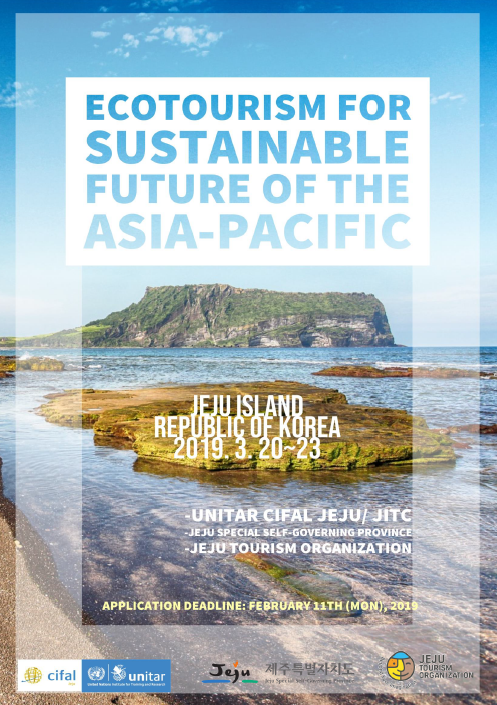|
Workshop on Ecotourism for Sustainable Future of the Asia-Pacific
Background
For the last few decades, tourism has undergone remarkable growth, making significant contribution to the local and national economy. Tourism accounts for 10 per cent of the global GDP, creating 1 in every 10 jobs in the world[1]. Every year, millions of tourists flock to various tourist attractions such as historical sites, museums and coastlines, bringing income and jobs to local communities. In addition, given the fact that more and more people seek for undisturbed nature and authentic experiences, local resources can be a valuable asset for tourism development. The trend of ecotourism has been consistently gaining attention since the mid-20th century, which now represents an estimated 11.4% of all tourism consumers spending[2]. Ecotourism is significant as it not only requires effort to preserve the environment and local culture from travel industry and community’s side, but also socially responsible attitude from the tourist’s side. As UNWTO’s Global Code of Ethics for Tourism (GCET) states, it is possible to achieve both the maximization of benefits as well as minimization of negative impact on the environment. Along with the UN designation of 2017 as the International Year of Sustainable Tourism for Development, the public interest in ecotourism is higher than ever. Ecotourism bears particular meaning within the Asia-Pacific context, as there has been increasing demand for diverse tourist activities involving nature and cultural immersion[3]. Moreover, Asia-Pacific tourism market has high potential as the global GDP share of the Asia-Pacific is now at 42%[4]. Relevant concepts such as Community-Based Tourism and Justice Tourism are also gaining popularity in the Asia-Pacific due to its abundance of natural resources, diversity of small-scale communities, and effort to close high income gap. In this regard, this workshop provides a venue for
participants to understand the relationship between ecotourism and sustainable
development in the wider context of the Asia-Pacific through innovative
training for local authorities. Best practices on sustainable development will
be presented, offering opportunities to explore well-designed ecotourism
development cases around the world. There will be sessions to discuss good
policies and practical ecotourism projects in line with the UN SDGs. Finally,
the workshop aims to help participants effectively develop relevant policies,
promoting and enhancing their geographical advantages for the social,
environmental and economic benefits in the long term. Event objectives
The workshop aims to build capacity of participants on ecotourism, whilst
promoting awareness and recognition on the importance of UN SDGs. For the
capacity building, this event will; ·
Provide an opportunity for the local governments in the Asia-Pacific region
to exchange tourism policies and best practices on sustainable tourism through city-to-city
cooperation; ·
Promote a learning atmosphere between cities and establish a strong network
which can be utilized after the workshop; ·
Offer a venue for knowledge sharing
and discussion and motivate participants to implement ecotourism policies, with
particular focus on UN SDGs. Learning objectives
At the end of the workshop, the participants will be able to: ·
Understand the ecotourism trends in the context of 2030 Sustainable
Development Agenda; ·
Utilize the lessons learned from the good cases of ecotourism; ·
Have a basic understanding of ecotourism
and deepen the ideas of sustainable practices for regional/city/local
development; ·
Share the best practices of the community/local government-driven tourism
projects; ·
Coordinate partnerships to effectively promote the benefits of ecotourism
with civil societies, government and
local entrepreneurs. Contents and structure
The training will
be composed of the following sessions: ·
Basic concept of ecotourism and the UN SDGs ·
Tourism as an economic development tool ·
Identifying natural and cultural resources for ecotourism development ·
Marketing strategy for tourism destination ·
Monitoring and evaluating ecotourism projects ·
Tourism finance and investment ·
Tourism development: case studies on community involvement ·
UNITAR-Developed City-Share Methodology **
Sessions are flexible to changes. ** Methodology
The training will be comprised of: ·
Lectures and presentations by experts (English and Korean) ·
Self-assessment exercise ·
Group work and discussion ·
Action plan presentation ·
Field visit to well-managed touristic
spots Target audiences
Central/local
authorities and representatives from NGOs, regional and community-based
organizations, academic and training institutions and other local actors, who
are working in the field of tourism, environment, culture within the
Asia-Pacific region. Event details
·
Event type Workshop (training program) ·
Date 20-23 March, 2019 ·
Venue Jeju International Training Center, Jeju-do,
ROK ·
Organizers - UNITAR - UNITAR CIFAL Jeju/JITC - Jeju Special Self-Governing Province - Jeju Tourism Organization · Certificate UNITAR and UNITAR CIFAL Jeju/JITC will jointly issue a certificate upon the completion of the training. Requirements
Applicants are
required to: ·
Submit necessary documents on time, i.e., application forms etc. ·
Complete and submit pre-training assignment, i.e., case study description
etc. ·
Actively participate in the training program. *Additionally,
Participants are required to bring a personal laptop. We will be launching an
online CityShare Platform in March which will involve high laptop usage. Application and deadline
Send the following documents to cifaljeju.etd@gmail.com by 11 February, 2019 (Mon):
** Late application will not be accepted. Note
·
Application without the required documents will
NOT be considered. ·
Participation is subject to approval of the
application by UNITAR CIFAL Jeju/JITC. ·
Selected applicants will be notified
individually. Assistance with travel expenses
·
UNITAR CIFAL Jeju/JITC provides LIMITED financial
assistance with the airfare to Jeju-do, Republic of Korea.
·
Local expenses (transportation, accommodation and meals)
during the workshop will be covered by UNITAR CIFAL Jeju/JITC except for
arrival and departure days. ·
All other expenses (local transportation in their country,
visa fee) should be covered by the participants. |
|||||||||||||||||||||||||||||||||||||









